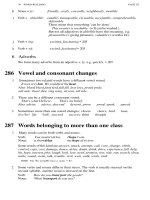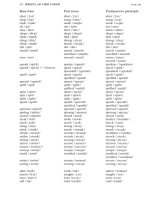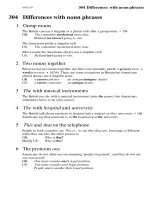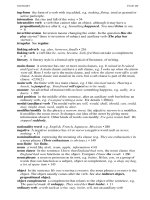To inf or gerund Review English Grammar with Powerpoint
Bạn đang xem bản rút gọn của tài liệu. Xem và tải ngay bản đầy đủ của tài liệu tại đây (545.19 KB, 17 trang )
page 117, 118
How can we identify which verbs
followed by the to-inf and which
verbs followed by the gerund ?
2
The answer is…
LEARN BY
HEART
3
5
Like, dislike, love, hate are in special cases
6
4
Verbs followed by both (To-inf and Gerund)
With no change of meaning
Begin, start, etc.
With change of meaning
7
Some verbs can be followed by the
to-inf or the gerund, with some
change in meaning
8
Verb: Remember
Remember + gerund
This is when you remember something that has
happened in the past. You have a memory of it now.
I remember going to the beach when I was a child.
(= I have a memory of going to the beach).
• Remember + to + infinitive
This is when you think of something that you
need to do. (And usually, you then do the
thing).
•
I remembered to buy milk.
(= I remember first and
then I go to buy milk).
Verb: regret
• Regret + gerund
This is when you looks back something you did in the
past and you wish you hadn't done it.
• She regrets loving you.
• Regret + to + infinitive
• I regret to say that your interview was not successful
(= I am sorry to say… <formal>)
We use this construction when we are giving someone
bad news, in quite a formal way.
NOTE : With these verbs
remember, regret
+ gerund : something that
has happened in the past.
BE
Gerund follow “be” describes an activity,
a habbit.
To-infinitive follow “be” describes a
future event
• Phương Khanh habbit is
singing while she takes
a shower because she likes
Phương Thanh singer so
much.
to go
• Duy aim is
to the
Harvard University.
FORGOT
(have some opposite points with Remember)
I forgot to go to The Remix show.
( I forgot and so I didn’t go)
I forgot going to the meeting at 8 a.m.
(I forgot now that I went)
TRY
• Try + to + infinitive
when do sth difficult and you don't succeed in
doing it. cố gắng
I tried to lift the suitcase, but it was too
heavy.
• Try + gerund
when you do something as an experiment. thử
I tried lifting the suitcase again, with my friend.
STOP
+ V-ing: Stop what you were doing
We stopped talking when our teacher came in.
+ To-inf:
We stopped to study.
( to-infinitive describe purpose, the reason why
we stopped )
We go on to
excercise
riding
1. Alan can’t stand _________
on trains. (riding/ to ride)
2. Try (dressing/ to dress) _________the larger dress. There’s
no time to fight with the zipper. dressing
3. Justin remember __________(brusing/ to brush) his teeth.
He forgot ________(brusing/Totobrush
brush) this morning.
4. All she wants is ________(making/to make) her parents
believe in her in someday.
To make
5. As the famous saying goes, there’s no use ______ over spilt
milk. (crying / to cry)
6. Jim crying
stopped _________ his shoelace. Wait for him. (tying /
to tie)
To tie









